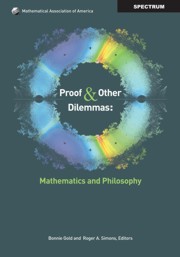Book contents
- Frontmatter
- Contents
- Acknowledgments
- Introduction
- I Proof and How it is Changing
- II Social Constructivist Views of Mathematics
- III The Nature of Mathematical Objects and Mathematical Knowledge
- 7 The Existence of Mathematical Objects
- 8 Mathematical Objects
- 9 Mathematical Platonism
- 10 The Nature of Mathematical Objects
- 11 When is One Thing Equal to Some Other Thing?
- IV The Nature of Mathematics and its Applications
- Glossary of Common Philosophical Terms
- About the Editors
11 - When is One Thing Equal to Some Other Thing?
from III - The Nature of Mathematical Objects and Mathematical Knowledge
- Frontmatter
- Contents
- Acknowledgments
- Introduction
- I Proof and How it is Changing
- II Social Constructivist Views of Mathematics
- III The Nature of Mathematical Objects and Mathematical Knowledge
- 7 The Existence of Mathematical Objects
- 8 Mathematical Objects
- 9 Mathematical Platonism
- 10 The Nature of Mathematical Objects
- 11 When is One Thing Equal to Some Other Thing?
- IV The Nature of Mathematics and its Applications
- Glossary of Common Philosophical Terms
- About the Editors
Summary
From the Editors
You may wonder why this chapter by Barry Mazur is in this section on the nature of mathematical objects. We have put it here because, in order to have an object, you need to be able to distinguish it from other objects that it is not identical to—as Cantor said, when defining transfinite numbers, objects must be “definite, well-distinguished objects of our perception or of our thought.” We must be able to tell when a mathematical object given one way is the same as that given another way: “the integer that is the successor of 1” and “the only even prime,” for example. The (general) solution to this problem is less obvious than it might initially appear, and this chapter is certainly the most mathematically sophisticated contribution to the question that we have seen.
In a way it is a continuation of the discussions on structuralism by the philosophers in this section, but now via category theory. It also leads naturally into the final section of this book, on the nature of mathematics.
Barry Mazur is the Gerhard Gade University Professor in the Department of Mathematics at Harvard University (www.math.harvard.edu/~mazur/) and a member of the National Academy of Sciences. His early work was in geometric topology, but he soon started working in algebraic geometry and number theory. In addition to his many mathematical papers, he has written several articles about the philosophy of mathematics, including “On the Absence of Time in Mathematics,” For the Learning of Mathematics (2004) and “Conjecture,” Synthese (1997). His mathematical expository work has won him prizes, including the Chauvenet prize in 1994 for “Number Theory as Gadfly” (American Mathematical Monthly, 1991).
- Type
- Chapter
- Information
- Proof and Other DilemmasMathematics and Philosophy, pp. 221 - 242Publisher: Mathematical Association of AmericaPrint publication year: 2008
- 5
- Cited by

